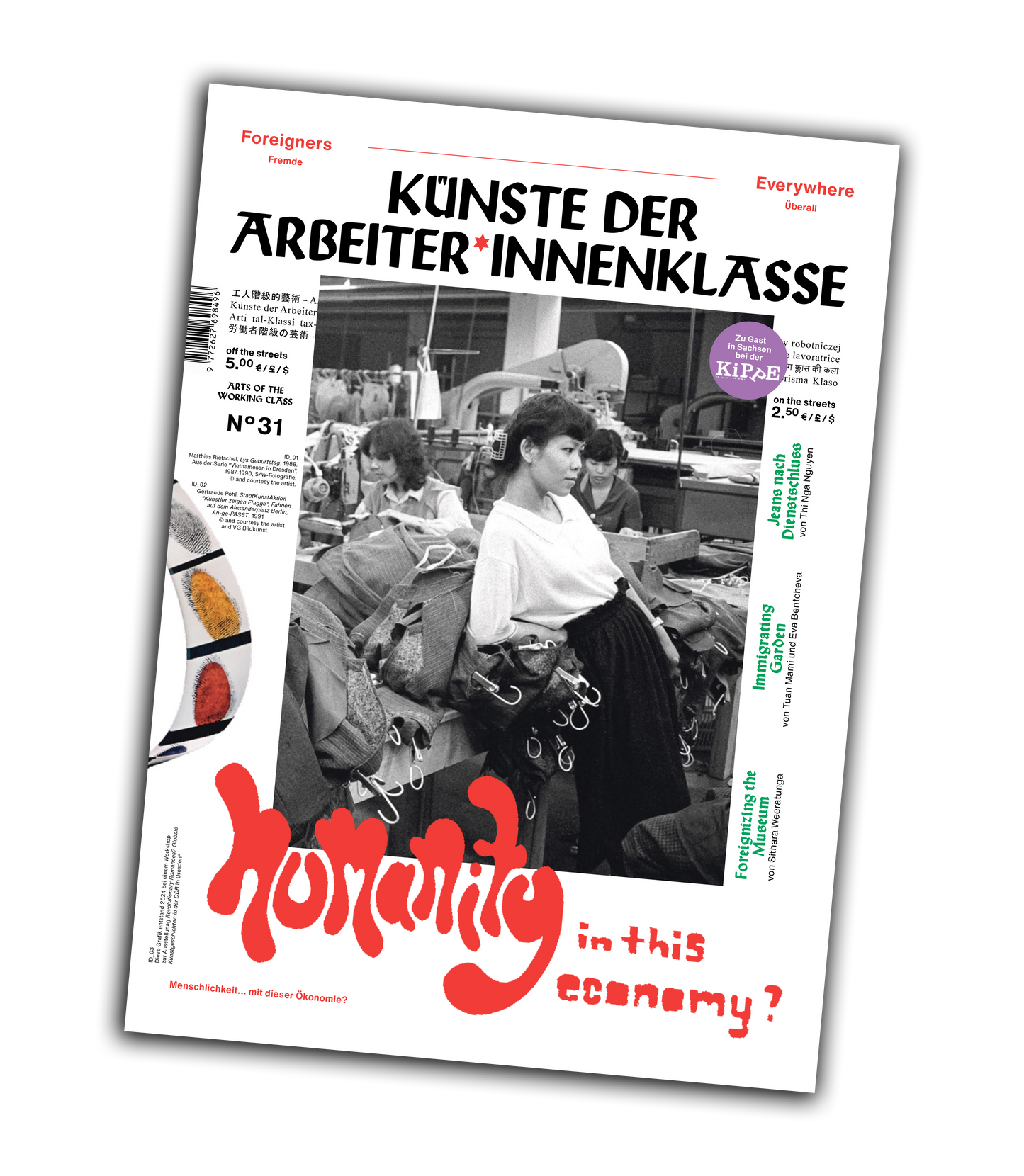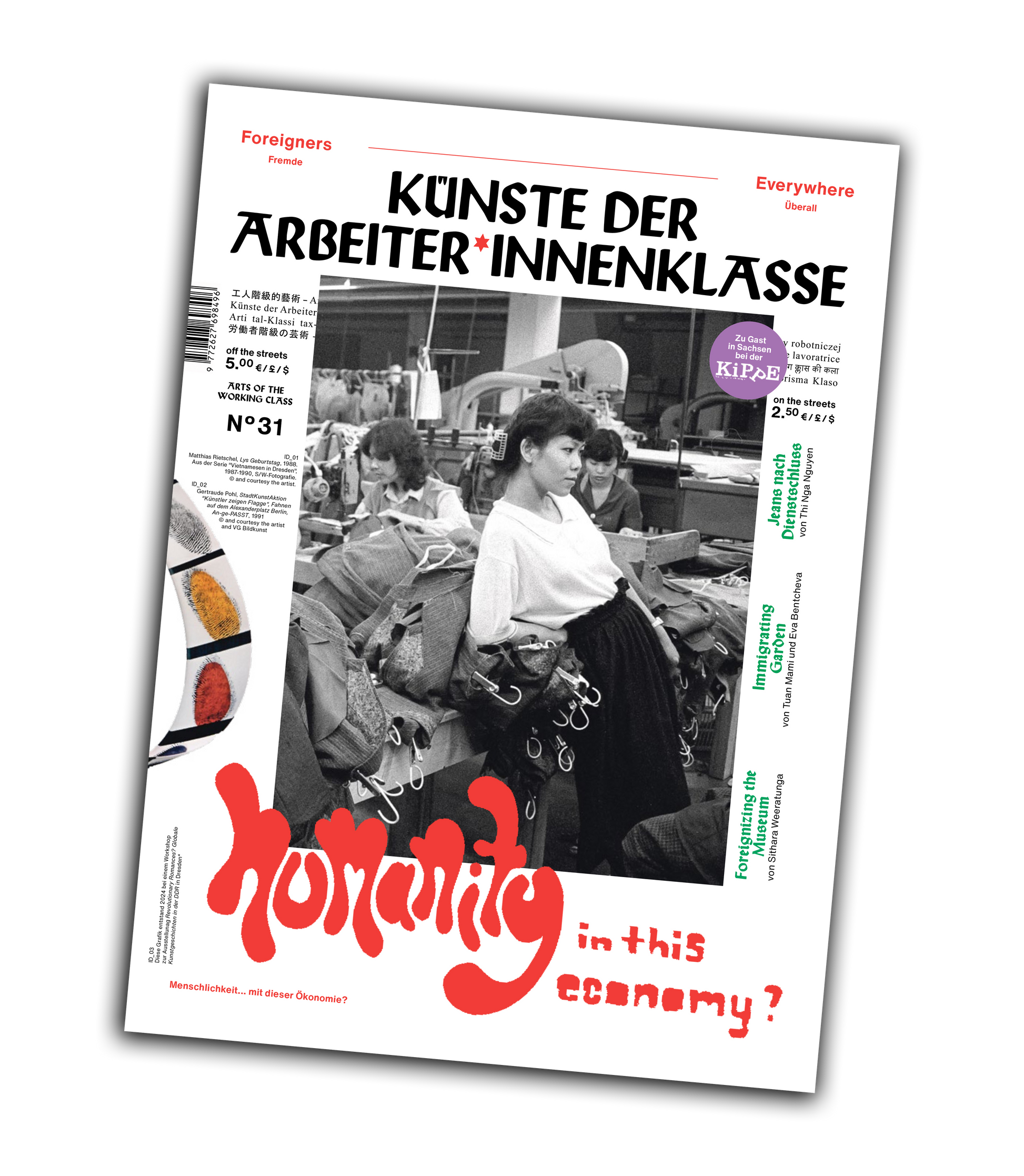Arts of the Working Class
ISSUE 31: FOREIGNERS EVERYWHERE
ISSUE 31: FOREIGNERS EVERYWHERE
Couldn't load pickup availability
DE
Jeden Frühling blühen die deutschen Landschaften in leuchtendem Gelb. Der Raps ist für viele der Inbegriff deutscher Monokultur, dabei ist er in Wirklichkeit gar keine. Bei genauem Hinsehen fällt auf: Auf den Feldern gedeiht ein buntes und reiches Leben!
Migration von und nach Deutschland gab es schon immer. Die Ausgabe Nr. 31 von Arts of the Working Class greift deshalb die Inspiration des Künstler*innenkollektivs Claire Fontaine für die diesjährige Venedig Biennale auf: Foreigners Everywhere – Fremde überall. Wie fühlt es sich an, in Deutschland fremd zu sein? Welche Erfahrungen von Verbundenheit stehen dem entgegen? Welche Möglichkeiten gibt es, Erinnerungen an diese Erfahrungen lebendig zu halten?
Menschen, die selbst von Rassismus und Ausgrenzung betroffen sind, können mit diesen Fragen tiefgreifend und vielfältig umgehen. Ihre künstlerischen Arbeiten und ihre Stimmen sind in dieser Ausgabe versammelt.
Der Schwerpunkt liegt dabei auf Positionen, die mit Erfahrungen des Fremd- und Verbundenseins, insbesondere zu DDR-Zeiten, zu tun haben. Denn die DDR war nicht provinziell und selbstbezogen; internationale Beziehungen wie zur Sowjetunion und anderen sogenannten Bruderländern umspannten den Globus.
Dies zeigen aktuell mehrere Museen, die sich in ihren Programmen mit unterschiedlichen Aspekten einer global verflochtenen DDR beschäftigen. Dazu gehören die Projekte Revolutionary Romances im Dresdner Albertinum, die Transkulturelle Akademie im Japanischen Palais ebenfalls in Dresden, der REINVENTING-Prozess des GRASSI Museum für Völkerkunde zu Leipzig; die Ausstellung VEB Museum im Deutschen Hygiene Museum Dresden; Re:connect. Kunst und Kampf im Bruderland im Museum der bildenden Künste Leipzig sowie Echos der Bruderländer im Haus der Kulturen der Welt in Berlin.
Diese Ausgabe entstand in Zusammenarbeit mit der Abteilung Vermittlung, Outreach und Gesellschaft der Staatlichen Kunstsammlungen Dresden und wird von der Beauftragten für Kultur und Medien des Bundes im Rahmen des Projekts "Museen als aktive Orte der Demokratie“ gefördert.
EN
Every spring, the German countryside blossoms in bright yellow. Rapeseed, for many the epitome of German monoculture, is not really a monoculture at all. A closer look reveals what it is: a colorful and rich expression of life spreading across the fields!
Migration to and from Germany has always been a reality. Issue No. 31 of Arts of the Working Class, therefore, takes up Claire Fontaine’s inspiration for this year’s Venice Biennale: Foreigners Everywhere - Fremde Überall. What does it feel like to be a foreigner in Germany? What experiences of connectedness stand in contrast to this sense of otherness? What possibilities are there to keep memories of these experiences alive?
People affected by racism and exclusion deal with these questions in profound and multifaceted ways. Their artistic works and their voices are brought together in this issue.
This time, our focus is on experiences of being foreign and connected, specifically during the GDR era. The GDR was not provincial and self-centered; international relations, such as with the Soviet Union and other so-called “brother countries” [Bruderländer] spanned the globe.
This is reflected in the current programs of several museums engaging with different aspects of the globally-intertwined GDR.
These include the projects of the Staatliche Kunstsammlungen Dresden, including Revolutionary Romances at the Albertinum; the Transcultural Academy at the Japanisches Palais; the REINVENTING process at the GRASSI Museum für Völkerkunde zu Leipzig; the exhibition VEB Museum at the Deutsches Hygiene Museum Dresden; Re:connect. Kunst und Kampf im Bruderland at the Museum der bildenden Künste Leipzig; and Echos der Bruderländer at the Haus der Kulturen der Welt in Berlin.
This issue was produced in cooperation with the Department of Education, Outreach, and Society of the Staatliche Kunstsammlungen Dresden, and is funded by the Federal Government Commissioner for Culture as part of the project “Museen als aktive Orte der Demokratie” (“Museums as Active Sites of Democracy”).
Impressum / Imprint
Founders / Publishers
Verantwortlicher i.S.d . 18 Abs. 2 MStV
María Inés Plaza Lazo, Pauł Sochacki
Managing / Artistic Director
Amelie Jakubek
Editor-in-Chief
Dalia Maini
Konzept / Concept
Staatliche Kunstsammlungen Dresden
Christine Gerbich und Tanja Schomaker
Beratung durch Doreen Mende
Artistic Associate Editor
Lizza May David
Editorial Assistance
Noa Jaari
Online Editor
Elisa Fuenzalida
Artistic Project Development
Theresa Zwerschke
Administrative Assistance
Selma Louise Christoph
Distribution Assistance
Miguel Angel Espinoza
Proofreading
William Kherbek, Anne Waak, Noa Jaari
Graphic Design
Manuel Bürger
Online Design
Giorgia Belotti
Circle of Support - Volunteers:
Hassoumi Moctar Agali, Amina Zerourou, Lisa Smirnova, Ruslana Shabelnyk, Nina Abba, Hannah Lu Verse, anna zrenner, Sophie Franziska Schultz, Kira Schmitz, Nadine Bajek, Cora Pagano, Yasemin Şenkal, Lukas Grube, Duarte Eduardo, Felix Dengg, James Rhys Edwards, Louisa Maria Stank, Sophie Hartleib, Teresa Mayr, Leo Baumg.rtner, Katharina Thurow
Druck
LR Druckerei GmbH, Cottbus
Alle Vertriebs- und Kund*innenanfragen an die Verlagsadresse:
Reflektor Monde gUG (haftungsbeschr.nkt)
Lynarstrasse 38,
13353 Berlin
hey@artsoftheworkingclass.org
Arts of the Working Class can now be read digitally, too. Please find our vendors who carry a STREAD badge and you will be able to scan a code to digitally buy a copy and additionally the STREAD issue of each month.
Spendenkonto:
Reflektor Monde gUG
IBAN: DE64 1001 0010 0931 5031 07
BIC: PBNKDEFF
paypal: p@artsoftheworkingclass.org


